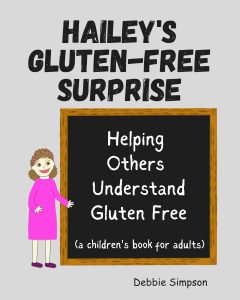This page may contain Amazon affiliate links.
The Emotional Side Part 7: Gluten Patrol
Safety Zone
Home is where we should all feel safe. And when it comes to the person living with a specialized diet, this safety aspect is true in many ways. If we can’t feel safe at home, we can’t feel safe anywhere. Gluten eaters in the home can cause the person with celiac to feel the need to put on that gluten patrol hat.
Home Is Where The Heart Is – But What About The Gluten?
*This post won’t be a debate over what is right or what is wrong in regards to how you run your kitchen. Your house rules are not for me or anyone else to judge. Some of us have homes that are 100% gluten free. Some homes are shared. For some this works. For others it doesn’t.
My Kitchen Then
Before I dig into this post’s connection to the emotions of being gluten free, which is what this series is about, I’ll give you a little peek into my kitchen. In the beginning, (or once I knew what I was doing) I had a gluten-free home. This was back before my kids grew up and moved out. It took me several months after diagnosis to clean everything, from the pantry to the drawers and everywhere in between. (It’s amazing how many crumbs can be found in drawers and on shelves.)
It was an overwhelming task at that time. I was unhealthy in the beginning, recovering from nutritional deficiencies that resulted from decades of living with undiagnosed celiac. I could barely keep up with my kids much less work on what was required to regain my health.
Besides learning how to eat gluten free for myself, I was also trying to figure out how to feed my family. I needed safe food for myself, but wanted to provide foods that were enjoyable for everyone else as well. As many of you know, it is work!
This process of cleaning my kitchen didn’t take days to complete. It took months.
*The decision to keep my home gluten free became even more powerful when we discovered that my son was gluten intolerant. Mama bear comes out when it comes to our cubs. There was no need to be on gluten patrol around my family or when my kids’ friends came over. Gluten free was a strict rule.
My Kitchen Now
Fast forward to today. If you’ve read my other posts in this series, you know my life has undergone some reconstruction. Today I am remarried (for 10ish years now!—whaaaat?! Yup, I was married 20 years the first time, 10 years now, and I’ve been gluten free for nearly 18 years.)
Anyway, back to topic. None of our kids live at home any more. It’s just us. When we moved in together, the whole gluten-free home was no more. Does that bother me? Sometimes. I have definitely had to put my gluten patrol hat on from time to time. But it’s ok. The only person eating gluten in our home is my husband, and he is careful.
We Practice Safe-Food
While my husband is allowed his gluten bread and cookies, we have a plan in place. His gluten items are contained in a small gluten cart, kept in a distant corner of the kitchen. He uses the top of the cart as a prep station for sandwiches, burgers, and such.
When he’s done he washes his hands and cleans the top of the cart, using paper towels and a cleaning spray (that I make using vinegar water and dish soap).
Isolating The Gluten
Besides keeping all gluten containing foods in his cart and only using the top for any prep work, my husband is careful when eating. If eating a sandwich or cookie while watching TV, he eats with one hand and uses the other for the remote control, washing hands afterwards in order to avoid cross contamination (since I use the remote as well).
I am the main cook in the house. I’m lucky that my husband likes my gluten-free pasta, gluten-free pancakes–and anything that I bake (generally, especially if it’s chocolate). But seriously, what’s not to like? My gluten-free cooking and baking surely tastes better than the store bought gluten versions he’d been eating.
I don’t always want to cook and bake, however. And I’m working at reducing my own carb intake. So instead of baking, its just easier for him to buy what he wants than for me to bake everything as I’d done when my kids lived at home. I’d honestly rather him buy his treats and bread than me having to bake all the time. And this isn’t a problem because he’s careful.
*When I do bake, I freeze! We don’t need 2 dozen cupcakes all at once. Frosted cupcakes, cookies, they all freeze well.
NO Other Gluten
Even though my husband is allowed his gluten in the house, the door is not open to others bringing it in–especially kids! I do NOT give my grand kids gluten or allow them to bring it in.
Why?
1) They eat like kids. Imagine that! Crumbs everywhere. I shudder at the thought.
2) I love their hugs and kisses and don’t want to deny those sweet moments.
I definitely don’t want to be the gluten patrol in my home, especially with my kids and grandkids.
But What If … (and here comes the emotional side)
What if I had to worry about someone in the house double dipping a contaminated knife into the butter or mayo?
What if my husband ate his gluten containing cookies with no care of keeping the crumbs in control?
What if he prepared his gluten filled sandwiches on the counter top right over my silverware drawer?
What if he didn’t wash his hands after he prepared or eating something with gluten, contaminating my cabinet drawers and refrigerator handle?
What if he rolled his eyes when I asked him to be careful?
What if I had teens who brought in pizza boxes, carelessly inhaling slice after slice in front of the TV, resulting in crumbs all over the sofa, coffee table, remote control (and door knobs, cabinet doors, and ev-er-y-where…..)
Can we say “stress”?
On Guard
Having to stand guard, making sure our kitchen is kept safe, is not anything any of us wants to do. No one wants to play gluten patrol.
But thinking our loved ones don’t care enough to be cautious (or avoid gluten in the home completely) can be even more difficult. It would be emotionally painful.
OUCH!
We’ve all experienced the eye rolls. It might have been a friend, family member, coworker, casual acquaintance, or server at a restaurant. It can be hard to comprehend that a single crumb of gluten is too much. But it is! And it IS a big deal!
What if that person rolling their eyes is a loved one? What if that person is living in your home?
I am fortunate not to have to deal with this. But I am still guarded. I still wonder, Does he think I’m exaggerating my needs?
I find myself playing gluten patrol as he finishes that cookie, watching to make sure he’s not cutting corners or cross contaminating the dish rag or cabinet doors. And I don’t like that feeling.
You might be reading this and thinking, That’s why we don’t have ANY gluten in the house! Or you might be reading this and wondering, How do I get my family on board with this kind of caution?
If They Could Walk In Our Shoes
What happens to us when we get gluten isn’t always something others can see. They cannot see the pain in your bones, the stomach distress, or what happens in the bathroom when you get gluten. And then, sometimes it is visual. A distended belly, a rash, or fatigue so great that you spend much more time in bed.
But still, it’s not something others can often comprehend — that this isn’t just something that makes us uncomfortable for a while. For someone with celiac, gluten damages our bodies. And, honestly, very often it is more than discomfort.
Anyone living in the house needs to understand this fact, that gluten DAMAGES our bodies. Without this understanding, the care put into what they bring into the house and the care they take, just might not be there. At least not as completely as it needs to be.
And without the care and effort from a loved one, how else does this impact the person with celiac? Besides physically? Well, I’ll tell you. It hurts!
Of course they don’t see you as un-important. They love you. They care. I hope so, anyway. But by not keeping your space safe for you, it can certainly feel like something less than love.
No Simple Solution
There is no real solution to home safety and the emotions that go with it. It all depends on your family dynamics. But I do know, we cannot expect others to respect our needs if we do not respect our own. Let me say that again so those in the back can hear me:
You cannot expect others to respect your needs if you do not respect your own.
And others will not respect your needs if you don’t demand it. Nicely. But you must be firm that, this is the way it has to be. It starts with you. Know that YOU are worth it!
Ending With A Visual
Need help getting others to understand?
Put a bowl on the counter on top of a piece of black construction paper. Now pour some (gluten-free) flour into that bowl. Poof! Those little specks of white against that black construction paper will show them how that gluten isn’t contained to that bowl.
Those airborne particles have to land somewhere, and this includes sneaking into those drawers and cabinets. No thank you! This is why I never allow gluten flour or baking mixes in my kitchen. Ever!
*Now, create a mock Rat Poison label and cover your container of flour. Ask your person how comfortable they would be in using dishes and utensils from surrounding drawers and cabinets if it was this poison that had just contaminated everything in the same way that the flour did.
You're In It Together
Communication is important. Mutual communication. No sarcasm or anger. And no pity. Talk. Listen. Work together.
For the person who needs to be gluten free, stand firm with your needs. Your health depends on you being 100% gluten free. It can be stressful enough without having to worry about safety in your own home.
For the person in the home who doesn’t need to be gluten free. It can be an adjustment. It might even make you sad, or upset.
Talk to each other. How can you make it work?
How do you make it work?





